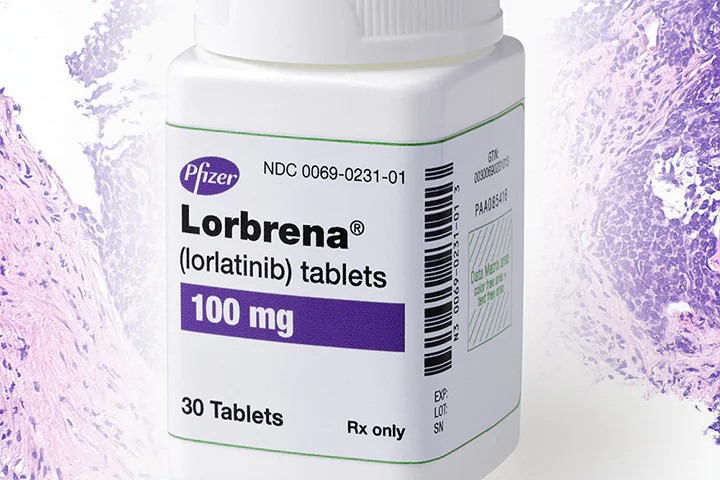Lorlatinib对ALK阳性肺癌显示出显著的CNS活性
时间:2021-02-19 作者:盛诺一家

一项国际性CROWN临床试验的中期分析显示,对非小细胞肺癌(NSCLC)和ALK基因重排患者,Lorlatinib比标准疗法的效果更高。
美国麻省总医院的 Dr. Alice Shaw及其同事说,与crizotinib相比,对于未经治疗的晚期ALK阳性NSCLC患者,Lorlatinib治疗可降低72%的疾病进展或死亡风险(HR 0.28, 95% CI 0.19-0.41, P<0.001)。
据《新英格兰医学杂志》报道,78%接受Lorlatinib治疗的患者在1年内没有疾病进展,而接受crizotinib治疗的患者只有39%,crizotinib是该试验设计时的标准治疗。
与crizotinib组的9.3个月相比,Lorlatinib组的中位无进展生存期尚未达到。总体生存数据还不成熟。
已证实的客观缓解率有利于Lorlatinib,76%的患者达到缓解,而crizotinib治疗的患者为58%。较高的缓解率主要归因于部分缓解(PR),因为接受Lorlatinib治疗的患者中73%达到了PR,而3%的患者完全缓解(CR)。crizotinib组的所有反应均为PR。
MD安德森癌症中心的Dr. John Heymach说,在类似的研究中,alectinib(Alecensa)和brigatinib(Alunbrig)也显示出优于crizotinib的优势,并且均被批准为一线治疗药物适用于ALK阳性疾病的患者。
Dr. Heymach未参与该试验,他表示,目前,alectinib是该领域使用最广泛的药物。Lorlatinib是2018年加速获批用于先前接受过治疗的ALK阳性转移性NSCLC患者。尽管这项研究没有直接将Lorlatinib与这两种目前的标准一线疗法进行直接比较,但在这项研究中观察到的疗效似乎与其他两种药物相当,甚至更高。
Lorlatinib还在149名意向性治疗患者以及基线时可测量的脑转移亚组患者中也显示颅内活动。在参加试验1年时,96%接受Lorlatinib治疗的患者在中枢神经系统(CNS)没有进展,而接受crizotinib治疗的患者有60% (HR 0.07, 95% CI 0.03-0.17)。
在接受Lorlatinib治疗的17名基线时可测量到脑转移的患者中,14名患者(82%)达到中枢神经系统反应,其中12名患者(71%)有颅内CR。相比之下,在使用crizotinib的13名脑转移患者中,只有3名患者(23%)达到中枢神经系统反应,其中包括1名颅内CR(8%)。
Dr. Heymach说,尽管所有的ALK抑制剂均表现出一定的CNS活性,但Lorlatinib的CNS活性尤为显着,大多数患者具有严重的CNS反应。他指出,对于ALK阳性患者,脑转移是“特别重要”的问题。
与crizotinib组相比,Lorlatinib组发生3/4级事件的频率更高(72% 和 56%)和更严重的不良事件(34% 和27%)。每组中有5%的患者因毒性而死亡。
在接受Lorlatinib治疗的患者中常见的不良事件是胆固醇水平升高和高甘油三酯水平。此外,有21%的患者有认知障碍,如记忆障碍、注意力障碍和混乱,16%的患者有情绪影响,如焦虑、抑郁和易怒。
Heymach将这些副作用描述为“显著的”,并且与该类别中的其他药物不同。他说,由于这些副作用,许多ALK阳性患者有可能继续先接受alectinib或brigatinib治疗,然后再接受Lorlatinib作为二线治疗。
尽管安全性有所不同,但Lorlatinib组和crizotinib组之间因不良事件引起的剂量中断率相似(49%比47%),而减量率也一样(21%比15%)。总体而言,由于不良事件,Lorlatinib组7%的患者和crizotinib组9%的患者中止了治疗。
Dr. Heymach说,在一线治疗中使用lorlatinib将部分取决于最终的疗效结果。”但是,当它们可用时,如果它们明显优于一线alectinib或brigatinib,那可能会鼓励许多医生将其开为一线选择。
Lorlatinib Shows 'Striking' CNS Activity in ALK Lung Cancer
Lorlatinib (Lorbrena) topped an older first-line standard for patients with non-small cell lung cancer (NSCLC) and ALK rearrangements, an interim analysis of the international, randomized CROWN trial showed.
Compared with crizotinib (Xalkori), treatment with lorlatinib reduced the risk of disease progression or death by 72% for patients with untreated advanced ALK-positive NSCLC (HR 0.28, 95% CI 0.19-0.41, P<0.001), according to Alice Shaw, MD, PhD, of Massachusetts General Hospital Cancer Center in Boston, and colleagues.
Reported in the New England Journal of Medicine, 78% of patients treated with lorlatinib were alive without disease progression at 1 year compared with 39% treated with crizotinib, the standard of care when the trial was designed.
Median progression-free survival was not yet reached with lorlatinib versus 9.3 months with crizotinib. Overall survival data were not mature.
The confirmed objective response rate favored lorlatinib, with 76% of patients achieving a response compared with 58% of patients treated with crizotinib. The higher response rate was largely attributed to partial responses (PRs), as 73% of patients treated with lorlatinib achieved a PR and 3% a complete response (CR). All responses in the crizotinib arm were PRs.
John Heymach, MD, PhD, of the University of Texas MD Anderson Cancer Center in Houston, told MedPage Today that alectinib (Alecensa) and brigatinib (Alunbrig) have also shown superiority over crizotinib in similar studies and both are approved as first-line treatments for patients with ALK-positive disease.
"Currently, alectinib is the most widely used drug in the space," said Heymach, who was not involved in the trial. Lorlatinib was granted an accelerated approval in 2018 for previously treated patients with ALK-positive metastatic NSCLC.
"While this study does not compare directly lorlatinib to these two current standard first-line therapies, the efficacy observed in this study appears to be at comparable to, if not greater than, these other two drugs," Heymach said.
Lorlatinib also showed intracranial activity in the intention-to-treat population of 149 patients and subgroup of patients with measurable brain metastases at baseline.
At 1 year, 96% of patients treated with lorlatinib were alive without progression in the central nervous system (CNS) compared with 60% of patients treated with crizotinib (HR 0.07, 95% CI 0.03-0.17).
Among 17 patients treated with lorlatinib who had measurable brain metastases at baseline, 14 (82%) achieved a CNS response, 12 (71%) of which had an intracranial CR. By comparison, only three of 13 patients (23%) with brain metastases achieved a CNS response with crizotinib, which included one intracranial CR (8%).
"While all the ALK inhibitors demonstrated some activity of CNS activity, the CNS activity of lorlatinib was particularly striking, with the majority of patients having major CNS responses," Heymach said. He noted that brain metastases are a "particularly important" problem for patients with ALK-positive disease.
The lorlatinib arm had more frequent grade 3/4 events compared with the crizotinib arm (72% vs 56%) and more serious adverse events (34% vs 27%). Five percent of patients in each arm died due to toxicity.
Common adverse events among patients who received lorlatinib were elevated cholesterol levels (70% any grade; 16% grade 3/4) and elevated triglyceride levels (64% any grade; 20% grade 3/4). Also, 21% of patients who received lorlatinib had cognitive effects, such as memory impairment, disturbance in attention, and confusion, and 16% had mood effects, such as anxiety, depression, and irritability.
Heymach described these side effects as "notable" and differing from other drugs in the class. He said it is "possible" that many patients with ALK-positive disease will continue to receive alectinib or brigatinib first and then lorlatinib as second-line treatment because of these side effects.
Although the safety profiles differed, the dose interruption rate due to adverse events was similar between the lorlatinib arm and crizotinib arm (49% vs 47%), as was the dose reduction rate (21% vs 15%). Overall, 7% of patients in the lorlatinib arm and 9% in the crizotinib arm discontinued treatment due to adverse events.
"The use of lorlatinib in the first-line setting will depend, in part, on the final efficacy results," Heymach said. "But when they are available, if they are significantly better than first-line alectinib or brigatinib, that would likely encourage many physicians to prescribe it as the first-line choice."
本文编译自Medpagetoday于2020年11月18日发布的《Lorlatinib Shows 'Striking' CNS Activity in ALK Lung Cancer》,原文链接:
https://www.medpagetoday.com/hematologyoncology/lungcancer/89775

【盛诺一家】 成立于2011年,是国内权威的海外医疗咨询服务机构,提供出国看病、全球专家远程咨询、日本体检等服务。
海外医疗为什么首选盛诺一家?
- 稳健运营
深耕行业15年:实缴注册资本3,970万元,获红杉资本、中信里昂、腾讯等多轮注资。 - 权威认证
全球医疗资源:与美国MD安德森、梅奥诊所、麻省总医院、日本癌研有明医院等官方直签合作。
官方认证 合规运营:唯一同时获日本MEJ AMTAC资质与外务省“身元保证机构”授权的中国机构。 - 专业服务
专业可靠:服务团队成员70%拥有医学背景,包括医学院博士、三甲医院医生、资深医学翻译。
智能匹配:自主研发专利“全球医疗资源匹配模型”,精准推荐医院与医生。
全流程个体化服务:从病历翻译、签证辅助、就医预约到境外陪同、生活支持全面覆盖。
全球服务网络:在中、美、英、日等地设有15个全资分公司与服务中心,提供落地保障。 - 客户至上
提供5%-40%医疗费用专属折扣,签约48小时可全额退款,出具风险告知,倡导理性就医。 - 良好口碑
合作企业:为华为、中国人寿、民生银行等知名企业提供海外医疗咨询服务。
媒体报道:多次获人民日报、CCTV、新华社报道,被人民网评为“出国看病机构第一名”。
客户信赖:盛诺一家已服务近10000+重症患者家庭,60%客户通过老客户推荐,满意度高达99%。
👉 如果您或家人面临重大疾病决策,想了解海外就医方案?
✅ 请拨打免费咨询热线
400-875-6700,或通过
官方网站
预约咨询医学顾问,获取专业建议,开启全球精准医疗之路。
本文为海外就医科普文章,内容仅供阅读参考,不作为任何疾病治疗的指导意见。文章由盛诺一家编译,版权归盛诺一家公司所有,转载或引用本网内容须注明"转自盛诺一家官网(www.stluciabj.cn)"字样。
 红杉资本(中国)被投企业
红杉资本(中国)被投企业














 咨询医学顾问——免费获取全球医疗评估方案!
咨询医学顾问——免费获取全球医疗评估方案!
 提交成功!
提交成功!


 出国看病费用评估
出国看病费用评估